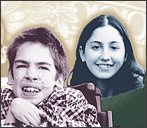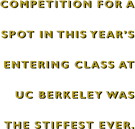

Each fall, some of the world's brightest freshmen pass under Berkeley's venerable Sather Gate.
Competition for a spot in this year's entering class was the stiffest ever. Some 3,500 students enrolled out of a record-breaking group of 30,000 applicants. Today, Berkeley is the most selective public university in the country -- more selective than elite, private institutions such as Cornell University, Duke University and the University of Pennsylvania.
Members of the freshman class all sport extraordinary academic and non-academic talent.
But the similarities between Berkeley students stop there.
"There is no such thing as a typical Berkeley freshman," said Bob Laird, director of undergraduate admissions. "They all have remarkable academic skills, but each has a unique range of experience outside the classroom. These differences will help them make important contributions to the university and the undergraduate student body." Laird said top students are attracted to Berkeley "because of our academic reputation, diversity, tolerance, innovative thinking and the excitement of the campus. Plus, it's a great bargain."
This is the first class chosen under Proposition 209, without the use of affirmative action. As a result, African Americans, Chicanos, Latinos and American Indians are expected to comprise roughly 11 percent of the freshman class -- a 48.8 percent drop from 1997.
This also is the first year for a new Berkeley admissions process that examines more intensely each applicant's academic and non-academic achievements.
To introduce you to the Class of 2002, here are profiles of four entering students.
![]()
Cathy Teves always hoped her two sons would be the first college students in the family. This fall, the dream is a reality, with Josh at Berkeley and Steven at California State University, Fresno.
 But the thought of attending college had been a nightmare for Josh Teves, whose family struggled with poverty.
But the thought of attending college had been a nightmare for Josh Teves, whose family struggled with poverty.
In search of work, his mother, a single parent, frequently moved her brood around the country. "We rarely attended any one school for a whole year," said Teves, 17, "and my grades suffered as a result."
To help with the bills, he worked as a fruit sorter, cashier and pizza maker. But there still wasn't enough money.
"I often found my mother sitting next to a pile of bills and crying," Teves said.
Her struggles strengthened Teves's resolve to go to college.
When his mother finally found a steady job as a cook in Planada, a Central Valley town, Teves's grades began to pick up. He graduated at the top of his class this past spring and, now at Berkeley, plans to major in biochemistry.
His academic excellence helped earn him admission to Berkeley, but Teves said his mother's influence deserves most of the credit.
"She made many sacrifices for me," he said, "and I intend to pay her back by succeeding at Berkeley."
![]()
Tune into KRON-TV Saturday mornings at 10 and chances are you'll see Tracee Worley reporting on binge drinking, cosmetic surgery and other issues facing young adults.
 As a field correspondent for First Cut, the San Francisco station's weekly teen magazine show, Worley investigates trends and interviews up-and-coming movie stars and musicians.
As a field correspondent for First Cut, the San Francisco station's weekly teen magazine show, Worley investigates trends and interviews up-and-coming movie stars and musicians.
"I really had no training for television reporting," said Worley, 17. " I learned on the job and by watching other newscasters at the station, like Belva Davis and Wendy Tokuda."
More than 200 teenagers, many with agents and professional experience, applied for the position. But Worley, a novice, was hired. Getting the job fulfilled her lifelong desire to be on TV.
"Ever since I was a small kid, I loved being in front of a camera," said Worley. "I even made my own home videos."
Worley is majoring in mass communications at Berkeley, hoping to someday become a news anchor or a VJ (video jockey) on MTV.
She said the skills she learned as a reporter will help her in college.
"I've improved my writing, analytical and public speaking abilities," she said. "But more importantly, I've learned how to connect with people."
![]()
Getting into Berkeley is tough. Being admitted at age 14 is even harder. Ian Christopher Mackey Newman accomplished both while coping with congenital muscular dystrophy, a condition that keeps him in a wheelchair.
 Challenges like these are nothing new to Mackey Newman, now 15, who has spent most of his life dispelling misconceptions about being disabled.
Challenges like these are nothing new to Mackey Newman, now 15, who has spent most of his life dispelling misconceptions about being disabled.
"Many people, including teachers, doctors and other professionals, think that because I'm physically disabled I'm also mentally disabled," said Mackey Newman, who skipped kindergarten and fifth and 10th grade. He is majoring in physics at Berkeley.
The campus's academic reputation and diversity -- and two generations of Cal graduates in the family -- helped Mackey Newman choose Berkeley.
But it was the campus's independent living services that cinched the deal.
"The Disabled Students' Program is providing me with a classroom assistant, a voice-activated computer and a special dorm room designed for disabled residents," said Mackey Newman.
Mackey Newman's mother will stay in Berkeley for one semester to assist with her son's transition to college, but after that, he's on his own.
"I can take care of myself. I'm pretty independent and always have been, that's how my mom raised me," said Mackey Newman proudly. "Plus, I'll be too busy studying to get into too much trouble."
![]()
Erin Skidmore's life has revolved around music for as long as she can remember.
 At age six, she began studying classical piano, developing a talent that won her numerous awards, scholarships and honors.
At age six, she began studying classical piano, developing a talent that won her numerous awards, scholarships and honors.
Equally adept at singing, Skidmore, at age eight, was offered placement with the prestigious San Francisco Girls Chorus. Advised not to strain her still-developing voice with the rigors of professional performance, Skidmore postponed serious vocal study until her voice matured.
It would seem natural for her to major in music at Berkeley.
Instead, she chose physics.
"Music is something I do for me, not for other people or for money," said Skidmore, 18, who also enjoys writing and competitive swimming. "I've never really considered it as a career."
A job at the Lawrence Berkeley National Laboratory last summer helped Skidmore decide on a career in physics. She designed pages and wrote and edited articles for the lab's educational website.
"I love talking to the scientists about their research, then translating and sharing this information with others," said Skidmore.
She hopes to combine her interest in science with her love of writing and become a technical writer after graduation.
And she isn't giving up on music.
Said Skidmore, "I'd like to participate in some of the student vocal groups, volunteer at KALX and join a rock band, if possible."
by D. Lyn Hunter
![]()


[Table of Contents] [Berkeley Magazine Home] [UC Berkeley Home Page]
Copyright 1998, Regents of the University of California. All rights reserved.
Comments? E-mail ucbwww@pa.urel.berkeley.edu.